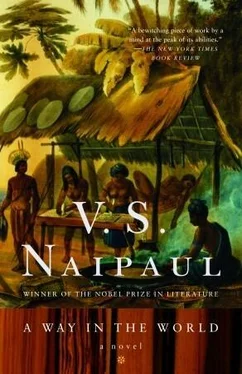“He pretended to be very angry. He lined up everybody on his estate, had one of the corpses brought out, and said he intended to find out who the poisoner was. The estate doctor cut the corpse open and he and Begorrat began to look at it very closely.
“It was too much for the poisoner, who was the hospital nurse. Her name was Thisbe. She broke from the watchers and ran through the cocoa woods to the neighbouring estate and asked there for sanctuary. Bernard tells me that this is what they do in certain parts of Africa: people from one village can claim sanctuary in another village nearby. She was handed back. Begorrat had pack thread tied around her thumbs and she was suspended by the thumbs until she gave the names of about twenty poisoners and sorcerers on other estates.
“It frightened people that there were so many. That very day they were all picked up and taken to Vallot’s jail in the town. They were kept apart from one another. They were chained or put in irons and some were shut up in the special hot chambers below the roof. Some of them were chained so that they couldn’t move. Some of those in the hot chambers quickly became demented. They were fed on plantains and water and over three weeks they were examined and examined in the jail by Begorrat and a poisoning commission of planters. Thisbe was repeatedly tortured. When it came to the judgements the planters followed Spanish forms. The people judged to be poisoners and sorcerers were heavily chained and made to kneel to hear their sentences. Some of them were hanged and decapitated. The new Negroes among them were first baptized; Africans are considered infants by the Church, and can be baptized without instruction. One man was burned alive. Thisbe was hanged and decapitated. Her body was burned and her head was staked on a pole in Begorrat’s estate.
“Begorrat tells Thisbe’s story like a story he has told many times. The pole on which Thisbe’s head was staked is still there, facing the Negro houses, almost on the spot where the corpse was cut open.
“He said with a smile, ‘There’s nothing there now. But they see the pole all the time and they know what they’re seeing. It’s magic against magic. I’ve told Bernard many times. It’s the only way. Here it’s my magic against theirs.’
“He told this story in the little grotto he has created in the hillside, and his current favourite — Bernard says he has had several — threw himself about with laughter whenever Begorrat smiled. He smiled often. He smiled especially when he talked about opening the corpse and pretending to look carefully at it, like a Roman reading the entrails, and when he said it was his magic against theirs.
“His lips are soft, but his speech is precise, biting and witty. The elderly cocoa marquis is much better educated than most people here, and he knows it. The people who defer to him tell you behind his back that when he came here from Martinique all those years ago he was bankrupt. All the Negroes he brought with him were mortgaged in Martinique; so the big tract of valley land he got free from the Spanish administration, sixteen acres for each Negro — the land that is today his little kingdom — was fraudulently obtained. I am sure he knows the stories. I don’t think he minds in the slightest. He has calculating, merry eyes. He is like a man who knows he can afford to laugh.
“It isn’t only Thisbe’s head-pole that’s still there at Begorrat’s. The old jailer Vallot is also there. He is the man who tortured Thisbe and many others. He would like to go to the United States, to Louisiana. He says he has relations there, and he might get a job. There is nothing for a free man to do here. But Hislop is not giving him a passport. It was Vallot who tortured the free man of colour in Hislop’s first week as governor here — the man of colour who used a love potion to get the black woman to sleep with him, and got people frightened all over again with thoughts of poison and sorcery. This is the case that has been tormenting Hislop ever since the Picton conviction last year. The free people of colour have raised a fund and retained a lawyer in Red Lion Square in London and are pressing the matter hard. Hislop is determined that if the case comes up, Vallot will bear responsibility as an official who exceeded his duty.
“Vallot is an elderly, pasty-faced Frenchman from Martinique. He came here in the Spanish time and acted as jailer for thirteen years. He has had no job for some years now. The local people decided to get rid of him at the time of Picton’s arrest. He has used up his savings and is dependent on Begorrat’s charity. He lives on slave rations in a Negro hut among people like those he used to flog and mutilate. Apparently they accept him. And he, curiously, has no feeling of humiliation or danger. Bernard says that no one at Begorrat’s will poison Vallot. Poison is a weapon only against the master. The man who is almost certain to be poisoned is Begorrat’s current favourite, and everyone knows it.
“Vallot doesn’t know anything about me — he doesn’t know much about anything outside the island. They had told him I was a general, and he had put on quite good clothes (possibly pawned in the old days by a prisoner, or offered instead of the jail fees) to come and tell me his story, and to ask for my sympathy and help. He talked a lot about the illness of his wife. She has a lovely name: Rose-Banier. He says that she used to serve all the paying prisoners with her own hand and used even to make coffee for them in the mornings. She was up and down the three floors all day, he said. Now she is old and ill and can hardly look after herself and their one-room hut.
“And all the time old Begorrat, in his pantaloons and buckle shoes, in this cool cocoa valley that is his kingdom, smiled with his soft lips at Vallot’s tale of hardship, and his favourite laughed and rolled about the floor of the grotto.
“There have been great revolutions on both sides of the Atlantic. There is a war in Europe that will further change the world. Great admirals and generals and new inventions are constantly altering the nature and scale of war. Even Mr. Shrapnel’s recent invention will in time be part of the general change; when it is taken up there will have to be new battlefield tactics. But here we might be on another planet, or in another age. Here they have their own heroes and histories and mythical events and sites: the hot chambers of Vallo t’s jail, the dismissal of Picton, the commandeur’ s last address to the atelier, the poisonings at Montalembert’s, the opening of the corpse at Begorrat’s, Thisbe’s running through the cocoa woods to ask for sanctuary, the spiking of her head. Here they attach different events to years as they pass; it is almost as though, like the Indian nations of the continent, they have another kind of calendar.
“I dwindle, Sally. I sit in Bernard’s verandah and look at the cornbirds’ long straw nests hanging from the samaan and immortelle branches, and hear the women talk in the jalousied room, and I write essays about the liberation of South America for future publication, and compose this journal-letter to you.
“I mentioned Shrapnel in this letter yesterday. His name simply came to me as I was writing, one of the hundred London names I carry in my head. You will remember that four years or so ago he wrote to me at Grafton Street about his invention and asked me to a demonstration in some fields somewhere. It is strange to be where I am and to think about reading Shrapnel’s letter in the library at Grafton Street and arranging with others to go to his demonstration. It is as though it hardly happened, or happened to another man. I feel — with Vallot — that there is no room for me here. I have no function. I lose touch with myself, even with my ambitions.
Читать дальше












